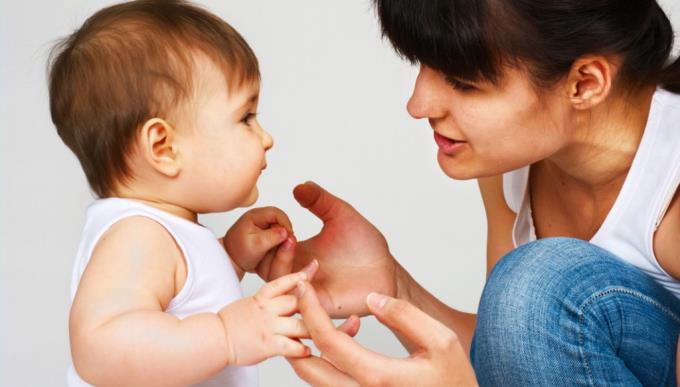Children learn to speak and develop their language skills around the first 2 years of life. Right from the womb, babies have learned the first rules of language.
1 / The child's language development ability
Your baby's speaking process begins with children learning to use their tongue, lips, palate and any newly emerging teeth to make the right sounds, starting with crying, then popping sounds. , ô, a for the first month, and babbles not long after. Children will start to say simple words such as ghost, polygon, making their mother extremely happy.
From this developmental milestone, babies will continue to talk more, by mimicking and observing mouth movements as well as listening to sounds from people around them. It is not uncommon for babies to speak 2-4 words between 18-24 months of age. When babies can control their emotions and behavior, they can express to others what they see, hear and feel.

Looking forward to each child's developmental milestones Every day with your baby is a joy of discovery. It is not uncommon for your baby to discover new skills with each passing day. At each age, your baby will have different developmental milestones. Only when mastering this, can parents keep babies safe and healthy.
2 / How does the child's speech practice develop?
Knowing the important milestones in this process, mothers will know how to teach children to learn to speak and help their children develop better language skills. If your baby is raised in a bilingual environment, he or she may be a bit slower to speak than others.
In the womb: Many researchers have shown that babies begin to understand language while still in the womb. As well as feeling a mother's heartbeat, babies can also receive their mother's voice and distinguish many other voice types.
-From birth to 3 months: Crying is a very primitive form of communication for a baby. Depending on the child's personality, mothers can decipher their baby's needs through calls. A scream can mean your baby is hungry, an annoying intermittent cry means your baby wants to change diapers. As they get a little older, they will begin to sigh, or make other funny noises on their own. With regard to language comprehension, children begin to realize how sounds form and the similarity of words coming from everyone around them.
From 4-6 months: At this stage, babies begin to babble, combine vowels and consonants, such as ba ba, ya ya. At about 6 months, the baby can react when the mother calls out her name. You can easily hear it when your baby says ma ma or pas. Your baby's efforts to talk to her mother are endless. Babies always try their best to use their tongue, teeth, palate and larynx to make funny sounds to communicate with people. Interestingly, babies of this age all over the world make a similar sound like ba, ma, ka, da, ya.

Regularly talk and listen to your baby to help him practice speaking!
-From 7-12 months: Your baby will gradually babble according to the sounds heard and try to speak like. At this stage, mothers should often read books, tell stories or talk with their children to help develop their language skills.
- From 13-18 months: Now your baby knows how to use one or more words when talking to his mother, and begins to recognize meaningful words. Babies can even raise or lower their voices with words they know depending on the context.
From 19-24 months: Your baby can speak about 50 words, and at the same time his ability to understand language also develops a lot. Children observe, listen and learn new words every day. At this age, the baby can already speak 2 words, for example, mom, dad, holding, hanging out ... I feel quite mature because I can express what I want, she often has the tendency to do only what you like. Mom can't fix baby when she says Mom sandals instead of mom.
-25-36 months: Babies have started to distinguish how to call, know how to confess their children and have to call their parents. During this age, the baby's vocabulary is constantly developing and expanding. Children can match nouns and verbs together to make a simple sentence: I want to hang out. When I was 3 years old, my mother would have a great headache with a sophisticated, talkative kid in the house. Your baby will not stop making very interesting and funny comments and arguments, and at the same time ask and "bother" her a lot.
3 / Tell the mother how to teach children how to speak
- Talking often: Doesn't mean mom has to chatter nonstop. Instead, spend time with your child talking. Describe what mom is doing, ask questions, sing.
-Read for your kids: This is a great way to develop your child's small clumsy vocabulary. The smooth arrangement of words will help children understand the rules of language. Do not forget to tell the story with emotion, the baby will understand more fully the content of the story told by the mother.
-Always listen: And understand. Whenever babies babble, look into the baby's eyes to imply that the mother understands. Your baby will be encouraged to talk more to attract your attention.
>>> Discussions on the same topic:
How many months does the baby learn to speak?
Teaching children to practice speaking: 3 typical mistakes
Signs should be taught before learning to speak













